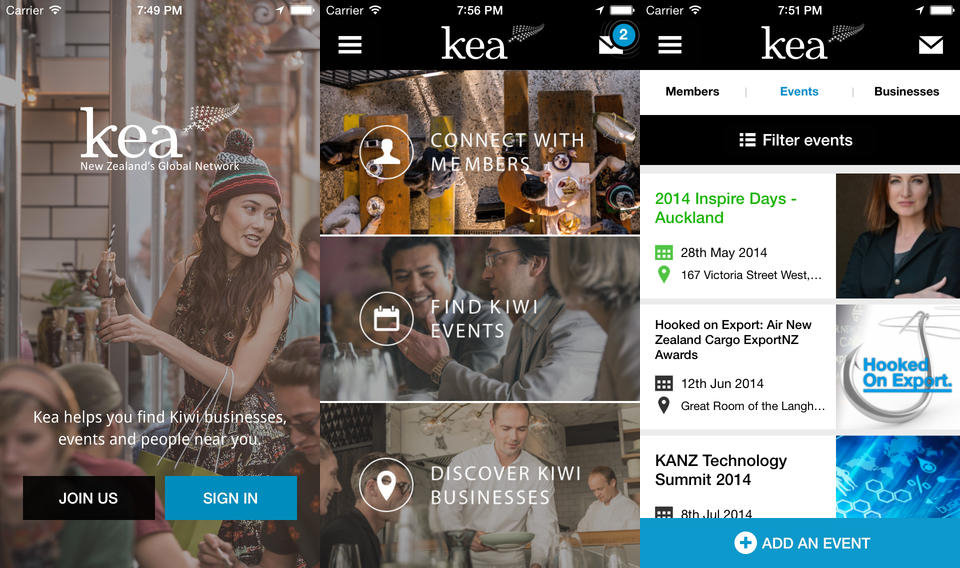Kea’s digital platform illustrates how technology erased borders for 500,000 online members, connecting the Kiwi diaspora

Leveraging the power of the mobile app, Kea has enabled mobile users to tap into networking opportunities the digital way. The Kea app allows users to list events, meet Kiwis at events, search for Kiwi organisations, among others.
Kea’s global communications director Sam Mickell told Idealog the old business model had limited impact but going digital has completely transformed the business.
“Two-and-a-half years ago, when I joined, we flipped Kea’s model around. Kea could only have a limited impact – in person – but with a digital focus, we could do more.
“We leveraged technology and created a new platform for users. We also needed to create a mobile proposition for Kea. In July, we launched an app which now has 15,000 users. The app uses geo location, to show where Kea members are, their relation in terms of distance (to others). The app lets users share messages with other Kea members, connects them to people in the same industry and shows NZ events around the world,” Mickell adds.
The system has worked so well, Kea has grown its membership to 500,000 from 200,000. “We have seen some really great things happen,” he adds.
So successful is Kea’s model that The Economist highlights Kea as a good model for diaspora engagement. The government of Paraguay is working closely with Kea to understand the model, with a view to embracing it.
Google office events
The Economist reported: “New Zealand offers a good model for Britain’s hands-off diplomats to emulate. Wellington has spent 30 years encouraging firms and philanthropists to root out Kiwis abroad. Its proudest achievement is the Kiwi Expat Association, a public-private partnership that supports and connects overseas New Zealanders through social media and networking events, and helps them return home if they so wish…”
One of the strategic moves Kea has made is leveraging Google’s office space to host Kea’s events across Asia Pacific. Kea hosted its first Google-office event in Tokyo, then in Sydney and Singapore. Through its Inspire series, Kea showcases highly successful Kiwis. In December, for instance, Sir Stephen Tindall will be speaking in Shanghai and Hong Kong, while two other Kiwi expats, CEO of Royal Bank of Scotland Ross McEwan, and head of Aviva Mark Wilson, will be speaking in London.
World Class Kiwis
Another aspect that has worked incredibly well, Mickell adds, is connecting businesses to successful Kiwis abroad. Kea’s World Class New Zealand network has over 400 leaders of industries and professionals who are willing to share their experience to help Kiwis who are faced with the challenges of gaining access into offshore markets.
It charges a nominal $250 to make the introduction. “A lot of what happens in this area, especially the information, is kept confidential. There is a lot of intellectual property shared that is happening under the radar,” Mickell says.
One example is a Kiwi company in the sports wear industry, who through an introduction, got connected to an expat Kiwi senior executive working in a US company. The expat Kiwi connected the sportswear company with a large sporting equipment company, resulting in a deal being done.
“We have helped opened up a new market for a NZ exporter, made introductions in the US venture capital industry, connected a NZ food and beverage company to high value hotel chains, and worked with a NZ wine company to get their product offshore, among others,” Mickell says.
Supplementing NZTE, China connection
On whether Kea is in direct competition with aspects of what New Zealand Trade and Enterprise (NZTE) is doing, Mickell says contrary to that, Kea plays a supplementary role to the work undertaken by NZTE. “NZTE plays a vital role in market validation, setting up frameworks for Kiwi companies to trade offshore. We are more about networking and creating introductions.”
One interesting feature that has emerged is, of Kea’s 500,000 online citizens, around 200,000 are from China. This, Mickell says, indicates those who spend time in New Zealand as students or as travellers, often build strong emotional ties.
Kea’s founding was formerly announced at the Knowledge Wave Conference in Auckland in August 2001. Its two principal funders were Sir Stephen Tindall and Prof David Teece, while Dr George Barker became the third founding director.




